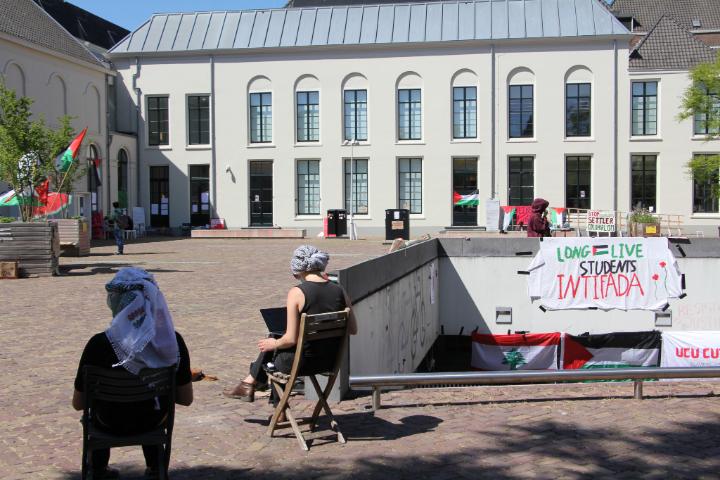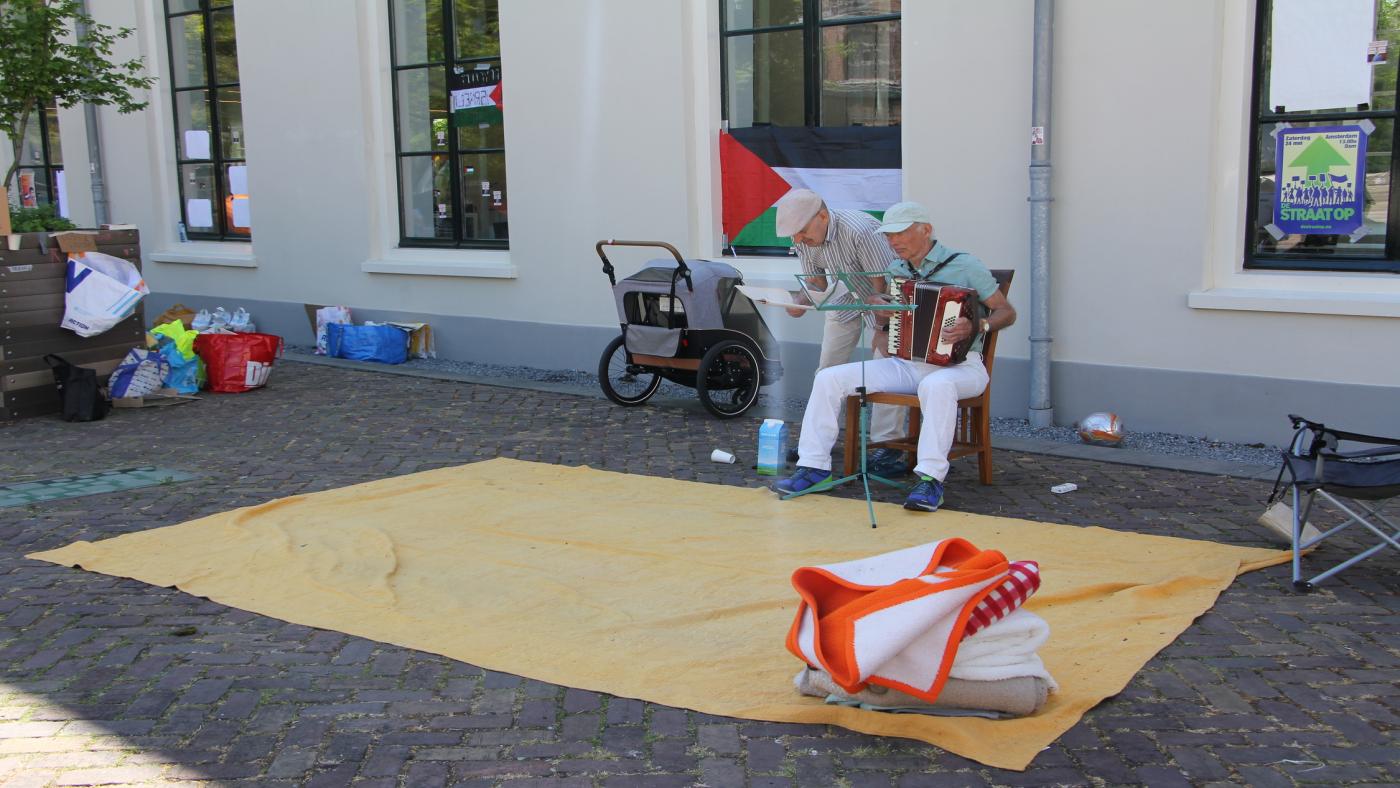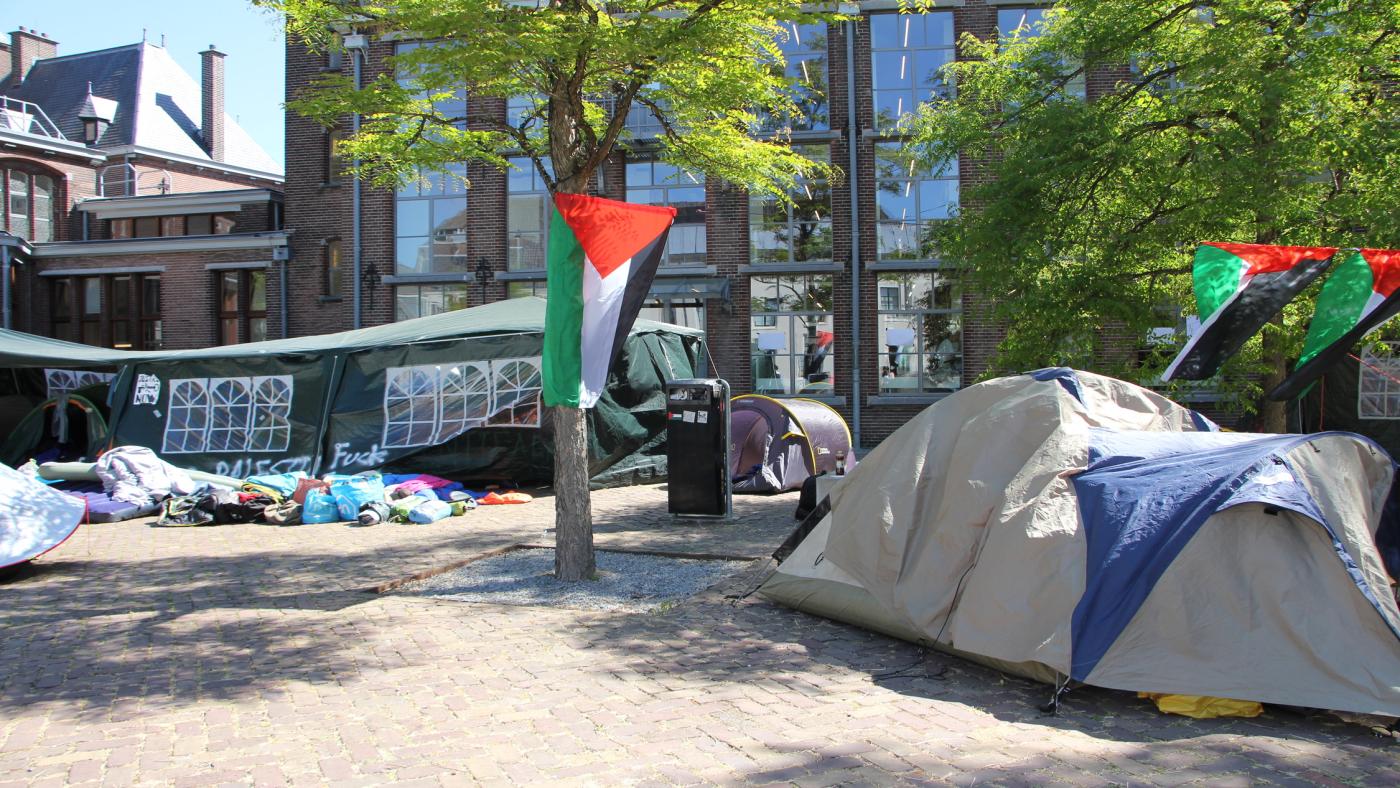Voices from the encampment
'It's the first time I feel like there is a community at UU'

It’s a sunny afternoon, when DUB visits the encampment. Around twenty five people are cleaning up their surroundings and planning for the day ahead of them. There is a study corner with some students working, a food corner with all types of dietary considerations, a wellbeing corner and a workshop corner.
There have been hosting lectures, screenings and workshops for days. Some workshops have included poetry, pin making and first aid, among other activities. While the students are busy organising activities, a duo of Dutch musicians say that they like the space and want to play some songs here, which the students welcome happily.

The courtyard is now called the Hossam Shabat Encampment, named after a journalist who was killed by the Israeli army. The pro-Palestinian movement has been occupying the courtyard of the library since May 7. The first attempt to occupy the space happened exactly a year ago, in May 2024, and the students see the new encampment as both a commemoration and an action against the lack of initiative taken by the university throughout the past year.
Their demands are still the same: cutting ties with companies and institutions that they deem complicit in the violence perpetrated by Israel in Gaza, particularly Israeli universities. They also want the university to speak out for Palestine.
Why the students are here
One of the people at the encampment is a first-year Master’s student at UU who has been spending their nights in the library’s courtyard from the start. They want to remain anonymous to protect their identity, like all students DUB talked to do.
This Master’s student is originally from the occupied Palestinian region and has family members there. They are inspired by their parents, who have grown up in the area. The student’s personal background and moral beliefs have led them to attach great importance to the issue since childhood. They have always attended protests for Palestine, but started engaging much more actively after October 2023. Since then, the student has been organising talks, lectures and screenings.
The encampment is the first time since coming to UU that they have found a community. “Everything is so dispersed in Utrecht and UU, but this is a real community.”
They emphasise the support and unity displayed by the members of the movement, and say that they have met fascinating people in the protests. “It has been lovely having people show up to play live music out of nowhere and singing along together,” they say, noting that the movement is balancing joyous resistance and serious activism. In their view, the movement does not lose sight of its protest while engaging in artistic endeavours, instead incorporating art into their demonstrations.
A third-year Bachelor’s student who has been active in this encampment and other student protests for Palestine explains her relationship with the issue as a non-Israeli Jewish person. She says that she has been involved with activism since she was twelve years old and, due to her culture, has been taking part in conversations about Palestine all her life.
Her personal values have led her to advocate for the Palestinian people with many other non-Zionist Jewish people. Furthermore, she sees activism as a major part of university life and explains it as “trying to see what the world is like and to make it a better place.”
She believes that the focus should be on solidarity with Palestine because of the urgency and direness of the issue. “The problem goes back seventy years and even without the current urgency, decisions need to be made.”
After the encampment started, UU President Anton Pijpers said that the university would consider its ties to Israel this week. She stresses that the university’s decision must be transparent, inclusive of Palestinian and student voices, and contribute meaningfully to the process.

An open space
A student who is also an employee of the university talks about trying to balance his involvement in the encampment with his work and study life. He has been going to work and school at the same time and trying to take part in the encampment as much as possible. Before October 2023, he was involved with activism in other fields but wasn’t focused on this issue.
He started participating by helping the organisers with his previous knowledge about protesting and got more passionate about the issue as he learned more. He described the environment as very inspiring and finds the “way people come together, show up to teach or to play music or give a workshop” beautiful.
“The movement operates horizontally, without any real leaders. Everyone takes roles according to their capacity and no one burns out,” He explains. “People are really taking care of each other. He also says that the group has been changing ever since as more people started getting involved. He sees the encampment as an “important organising space” and also “a space for learning.”
The protesters say they hope the students see the space they have created in the library courtyard as welcoming and not inhibiting. About the library closing at 6.00 pm, they say: “We have always wanted it to be an open space. The university is the one that restricted access to the library. Not us.”